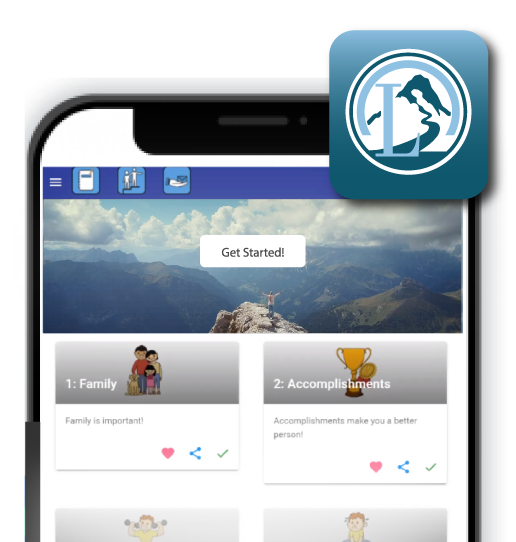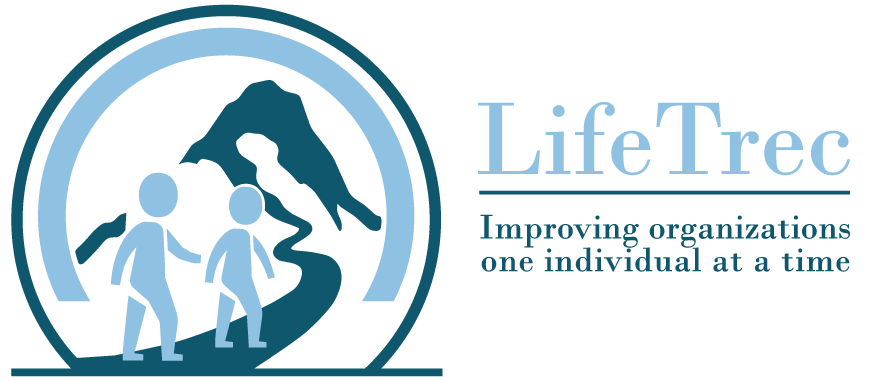Go from an occasional review to
Meaningful Leadership & Mentoring
Meaningful Leadership & Mentoring
The LifeTrec Journey
The LifeTrec App is a tool to help individuals and their mentors lay a path toward a healthy personal and professional life for worker and their teams. We know that people cannot give their best at work unless they feel valued as individuals, rather than being judged by characteristics like their race or gender.
What is more, we can only do our best at work when we see our jobs as both important and part of a meaningful life plan—a coherent vision of where we are and where we want to go in our careers and personal lives so that we can live by our values and achieve our goals.
Below are brief explanations of each category in the app, along with explanations of how to approach and complete the app lists.
Family
In the broadest sense, “family” includes all the people who are very close to us—people we consider important parts of our life, not just for now, but permanently. Family relationships, whether with a parent, sibling, spouse, or other loved one or close friend, encompass the most important attachments of our lives. Yet, all too often, we take family and friends for granted and even take advantage of them, straining or even breaking the bonds that add to our happiness in good times and resilience in times of trouble. Careers which require frequent changes in work locations can be especially hard on families because of the constant moving that often makes us miss out on events with extended family even as we face difficulties and tragedies.
Listing family members and close friends is important so that mentors can know who they are and how these relationships can affect our professional lives. This list will also help mentors keep track of who they can call on to be there for us at important times, whether to celebrate an anniversary or help with a sick child. It is also important that each of us reflect on these relationships when making important decisions, to understand how our choices may affect our families and remember not to take them for granted.
Accomplishments
An accomplishment is something you have successfully achieved. A formal award—winning that Blue Ribbon or Championship Ring—is only the most obvious, and often not the most important, accomplishment. Whenever we complete something important, whether it be graduating from high school, finishing a big project at work, or buying our first car, we have achieved something. When we say to ourselves “I haven’t really accomplished anything” we are not only selling ourselves short, we are also telling ourselves something that is not true. Consider two examples, graduating high school and raising children. Many people take for granted the fact that they have graduated high school. High school is a significant milestone, and we all knew this at the time we graduated but tend to discount this achievement over time. As graduates we are expected to be contributing members of society. We have shown we can work and support ourselves and function as adults. Raising children is another major accomplishment people tend to ignore in themselves. To support, nurture, protect, and teach children 24/7 is much more difficult than going to school or work, and requires dedication and selflessness to do it well. These are just two examples of significant accomplishments. Most of us have several other significant accomplishments and, however seemingly small, each is important for us to realize own strengths and worth.
When we list accomplishments, we have a chance to think back on what has been important to us and how we have overcome obstacles in our lives. People often downplay and severely discount what they have achieved, so it is important to catalog anything you can think of. Our lists of accomplishments show what we value as well as what we think our mentors will value. The list is never complete and will need to be fleshed out in discussions over time but helps show where we are in our lives and where we think we are headed.
Strengths
A strength is a capacity or ability to do something particularly well. When we talk about our strengths, we refer to our ability to do or accomplish something which gives us and advantage. Most obviously, someone who is physically strong has the capacity to lift heavy things. Likewise, someone whose “strength” is compassion can connect with, comfort, and help people dealing with tragedy or pain. Someone whose strength is intelligence can solve difficult intellectual problems.
It is important for us to know our strengths so that we can leverage them as often as possible. By building on our strengths, we can distinguish ourselves and contribute our best, improving the overall performance of the teams we work with. By telling our mentors about our strengths we enable them to put people in the right positions so that there are fewer “weak” areas overall and the organization as a whole can be made stronger.
Weakness
Just as we all have strengths, so we all have weaknesses—areas where we are not particularly strong, or actions we do not perform particularly well. While it is often important to improve our performance in areas where we are not strong—to become a better listener, for example—it is also important to know our weaknesses so that we can contribute our best to those who depend on us. This means we often must avoid situations where we will be the ones who must work on something we are not good at. This is especially true when someone else in the organization may be able to do a better job at a particular task.
Wise people work to understand their weaknesses so they can come up with a mitigation strategy. A mentor can help here. It often takes longer to improve on weaknesses than to build on strengths. This makes it important to work out which weaknesses require too much work to become proficient at and which are worth taking the time to improve on. Mentors and proteges need to approach weaknesses together in order to find the right jobs, at the right time for us. By avoiding placing individuals in the wrong jobs we improve overall performance, both for us and for the organization.
Values
When we talk about our “values” we mean what we care about, that is, what is important to us. We often think of things like health or family. But we more often mean being healthy or being part of a loving family. These values are conditions that help make up a good, meaningful, and happy life. Values can also refer to something less concrete but no less important. We generally think of values as something we have, like honesty. But values are often the ways we act—for example, acting with honesty. So, values can be understood as character traits, aspects of who we are or what we aspire to be in ourselves and our dealings with others. Whether it is courage, resourcefulness, or fortitude, the character traits we value help define who we are—as people who are steadfast under fire, able to think on our feet in an emergency, or able to keep going when times are tough. Both valuable conditions and valuable character traits are important to us in that they represent higher goals we are willing to work toward. If we are not willing to do the work (say, exercising to get and stay healthy, or training and studying to improve our resourcefulness) that probably means we do not really value the condition or character trait.
If we truly value something we are willing to work for it and sacrifice to attain it. Values, as either a condition or character traits, are our assessments of what we think is necessary to be a good person and lead a good life. The bottom line is that people and their mentors need to know what they value so they can pursue more of it, and also be aware of what they do not really value so they can avoid it.
Priorities
To make sense of our values—and our lives—we must prioritize. A priority is a high value—a concrete aspect of our lives that is especially important to us. But we value many things, and they may conflict with one another. We may value both friendship and integrity, for example. But when a friend turns out to be a thief or a traitor, does this mean we must be paralyzed by our conflicting values? The answer lies in understanding our priorities.
The simplest way to prioritize is to simply rank-order. A linear list of priorities simply puts them in order—1, 2, 3, etc. Weighting our priorities is an improvement on simple rank-ordering because some priorities are disproportionality more important than a standard list would imply. LifeTrec has a weighting function so you can quantify exactly how important each priority is to you and from there you can decide the amount and quality of time to be put towards each of them. Finally, it is important to understand that our priorities often change according to time and circumstance. Honesty may be our most important priority in most circumstances but may be simply cruel when asked our opinion about a child’s favorite outfit when we don’t like it.
Hobbies
A hobby is an activity that we engage in regularly during our leisure time. Hobbies can range from skydiving to stamp collecting. Some hobbies can take on inspiring proportions, as with someone determined to climb every mountain peak in the United States. Some people claim to have no hobbies at all because they are always working or pursuing some other duty. Hobbies are important because they give us the power to generate happiness through our own actions. The hormones of serotonin, dopamine and oxytocin make us feel pleasure in what we are doing or what we are about to do. Hobbies produce these hormones through active engagement. Pass times are not necessarily hobbies if they are passive and dependent on an external stimulus. Watching TV or spending time on social media are passive and depend on an external source for generating feel good hormones. This is dangerous because it can become an addiction. Active hobbies are liberating and help us control our own happiness and our environment.
It is important to list all your hobbies so your mentor can help you judge which you should emphasize, and which could help you and your organization improve. Some of our hobbies can be leveraged for the sake of the organization, meaning that everyone will benefit from the experience and knowledge we have gained in that area without it costing the organization anything. Hobbies like video making, art, and fitness all can be leveraged, for example in promoting the organization or helping co-workers become healthier. We can take increased pride in our superior performance and, by sharing stories about our hobbies, help build better, tighter relationships within the organization.
Healthy Habits
A healthy habit is a persistent behavior that is beneficial to our mental or physical health. Hobbies and health can, and should, coincide and can also be one and the same. While most of us know intellectually that healthy habits are important for promoting physical and mental health, relatively few of us try to build healthy habits. Habits are things we do without necessarily thinking about it and this takes time and effort, especially at the beginning. Exercise and a balanced diet will, without a doubt, improve all aspects of our physical (and even mental) life. However, healthy habits often fall to the bottom of our priority lists because they can be time consuming, uncomfortable or require a denial of pleasure.
Health is not something we can get or keep without intentional action. Long term health comes from a series of actions over time that become unthinking habits, even a way of life. By listing your healthy habits you and your mentor can identify strengths you can build on and also identify activities you may only engage in occasionally but that can serve as a basis for renewed and more consistent action.

Retirement Goals
Retirement goals are activities we would like to pursue once we retire from full time work. Studies have shown that money is not the biggest problem for retirees; the real problem is not knowing how to be retired. A retirement without rewarding activities is unfulfilling, and an unfulfilling retirement can quickly turn into a life crisis.
We all have ideas of things we would like to do in retirement—things like travelling, spending more time with family, and doing volunteer work. But, like character traits and healthy habits, retirement goals are things we must work toward. Every meaningful activity has a downside and most rewarding activities take time and effort, especially in the beginning, before we can enjoy them. Preparation, marketing, clean up, and other associated work may make that “fun” hobby not worth it for us. Other hobbies—think of skiing, playing an instrument, or gardening—may exhaust and frustrate us as we are learning them, but become easier and more enjoyable as we master them.
This means that, while it is fine to start some hobbies after we have retired, it is important to think through the activities we plan to put our hearts into once we retire and put in the time now to learn whether we will really want to make them a central part of our lives. In many ways retirement is a state of mind. We do not have to wait to enjoy our life free of stress. If we make a commitment to act like we are retired while not at work we can enjoy life in a more relaxed and stress free state of being.
Most of us have many things we would ideally like to do. It’s important to let your mentor know the variety of goals you have in retirement. Establishing a fulfilling retirement plan, and sharing it, enables your mentor to help you assess the up sides and down sides of each activity. They can provide you with different on which activities may or may not work together. Planning and practicing “being retired”, while still working, will significantly improve our happiness and well being when we eventually retire from full time work..

Professional Goals
Professional goals can be specific achievements, like flying a particular plane, or a career achievements like being promoted to a specific rank. They can also be more general, like becoming an expert in a given subject area. In laying out our professional goals it is important that we keep long-term, pinnacle goals in mind, but also that we focus on mid- and near-term achievements that will give us satisfaction, help us make an important contribution, and put us on our way toward that pinnacle.
There are three steps in setting professional goals.
- First comes your pinnacle goal. This should be a position you want to attain at the peak of your career and most likely the position where you will be paid the most, have the most impact, or feel the most personally rewarded. Your pinnacle goal should be a stretch for you—an aspiration you may not reach but have a reasonable chance at if you work hard. You may not know for sure what to choose as your pinnacle goal but should list something even if it is vague. Your pinnacle goal may change several times as you learn more about yourself and what you want. A pinnacle goal is required at all times because it is an important marker to help guide us in our professional life. Without this marker, we will stall and wander in a direction which does not benefit us and may even harm our future professional prospects.
- Second is your midterm goal. This 3–5-year goal should be a significant milestone toward your pinnacle goal. Whether it represents the “middle” of your career or not, this goal should be a significant achievement between where you are and where you want to be. It could be a promotion, a certification, or moving into your desired long-term specialization. This goal is one your mentor can help you with.
- The final step is filling in the positions between where you are now and your midterm goal, and the positions between your midterm and pinnacle goal. By doing this you and your mentor can think about the types of smaller but important professional achievements that will keep you on the path toward your goals, helping you plan your future and keep moving forward.

Personal Goals
Personal goals are things we would like to achieve outside work. Many of us keep a “bucket list” of things we would like to achieve—say, visit Paris or go whitewater rafting—in no particular order, over the course of our lives. Personal goals can also look more like professional goals—say, becoming a leader in a church group or coaching a winning Little League team—but outside of the work environment.
Your mentor can help you think about your personal life in ways that will help you understand and fulfill your personal goals. This involves understanding who you are and what motivates you, as well as knowing your strengths, limitations, and circumstances. Personal goals are placed on the same timeline as professional goals as a reminder that you must focus on achieving personal objectives. It is too easy to focus only on professional achievements, putting aside personal goals because you can “get to that later.” Personal goals are as important as professional goals. In fact, when we ignore our personal goals this can make us frustrated, depressed, and less able to give our all professionally.

Retirement Income
Planning for retirement is complicated and LifeTrec is not a financial planning application. However, a comprehensive mentoring program should ensure that you are planning for your financial future to reduce unnecessary stress now and in the future. Basic retirement planning requires two steps: first, setting a dollar figure goal for living in retirement which takes into account all of your reasonably expected expenses and, second, figuring out your sources of income (“income streams”) for retirement. It is inherently risky to rely on just one source of income for retirement. Other income streams could take the form of a diversified investment portfolio, rental properties, or side jobs such as teaching part time or any number of cottage industries like furniture making or quilting.
The first step is to establish your current baseline. This means listing the title of your current income streams, from your job and any investments you may have, along with the amount you receive from each of them. This baseline is important because it will allow you to mark your income growth from this point and help your mentor assess where your plan is strong and where it needs work. Once you have a baseline, you need to consider all of your retirement goals and establish a budget for the lifestyle you want to lead. Once you have your target budget, create a list of the retirement income streams you hope to have by then. Investments, real-estate, side jobs, inheritance or any other. With this accomplished it is a good idea to consult a certified financial planner who can use this plan to come up with a retirement investment and financial strategy.
Send Us A Message
Contact Us
Contact Us

Enhanced Leadership Mobile App
The LifeTrec App is a tool to help individuals and their mentors lay a path toward a healthy personal and professional life for worker and their teams.
